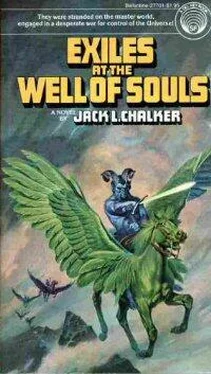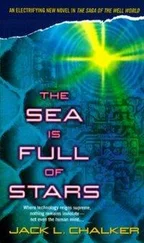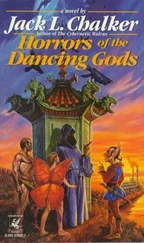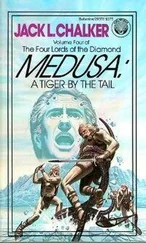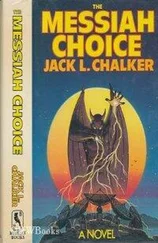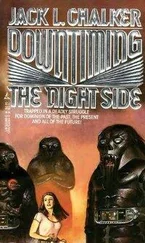Jack L. Chalker
Exiles at the Well of Souls
This book is for a number of old pros, who, wittingly or unwittingly, at various times have helped:
Leigh Brackett
Robert Bloch
Alfred Bester
Marty (Hicksville) Greenberg
Gordon R. Dickson
Harlan Ellison
Fritz Leiber
Harry (“Hal Clement”) Stubbs
Compton (“Stephen Tall”) Crook
Avram Davidson
Jack Williamson
and, most especially, to a man who has never heard of me but has had more influence on the field of science fiction than any ten comparable writers,
Mr. Eric Frank Russell
The format of this book is extremely episodic; the action will shift to several different people and events very rapidly, and this might cause some temporal disorientation to those used to reading a straight-line narrative. Therefore, the reader is cautioned to keep in mind that, unless the text specifically says otherwise, a scene-change is considered to be going on simultaneously with the preceding action, and that this is true, regardless of the number of scene changes, until the original characters come up again. The scheme may sound difficult, but it shouldn’t cause problems.
JLC
Gaemesjun Laboratories, Makeva
It wasn’t the fact that Gilgam Zinder’s lab assistant had a horse’s tail that was the oddest fact; the really strange thing was that she didn’t seem to think her condition odd or unusual.
Zinder was tall and thin, a gaunt man with gray hair and a long gray goatee that made him seem even older than he was, and more drawn. His blue-gray eyes, bloodshot and surrounded with darkening shadow, showed his overwork. He hadn’t thought to eat in more than two days, and sleep had become academic.
The place was a strange-looking lab at that. It was designed something like an amphitheater, with a circular raised pedestal about forty centimeters above the plain flooring that served as the stage. Above the stage was a device hanging like a great cannon but terminating in a small mirror with a tiny point coming out from it.
A balcony surrounded the apparatus; here, along the walls, were thousands of blinking lights, dials and switches, and central consoles, four of them, evenly spaced around the circle below. Zinder sat at one; directly across from him a much younger man in shiny protective lab clothing sat at another. Zinder’s lab suit looked as if it had been made in the last century.
The woman standing on the raised disk was an ordinary-looking sort, late thirties and a little dumpy and saggy, the kind that looks far better with proper clothes than nude as she now was.
Only she had a horse’s tail, long and bushy.
She looked up at the two men with puzzlement and some impatience.
“Well, come on,” she called to them, “aren’t you going to do anything? It’s cold down here.”
Ben Yulin, the younger man, smiled and leaned over the rail.
“Swish your tail awhile, Zetta. We’re working as fast as we can!” he called down good-naturedly.
And she was swishing the tail, slowly back and forth, routinely, echoing her frustration.
“You really don’t notice any difference, Zetta?” Zinder’s thin, reedy voice asked her.
She looked puzzled, then down at herself, running her hands along her body, including the tail, as if to find out what they did.
“No, Dr. Zinder, I don’t. Why? Is something about me—different?” she responded hesitantly.
“Do you know you have a tail?” Zinder prompted.
She looked puzzled. “Of course I have a tail,” she replied in a so-what’s-wrong-with-that tone.
“You don’t find that, ah, odd or unusual?” Ben Yulin put in.
The woman was genuinely confused. “Why, no, of course not. Why should I?”
Zinder looked over at his young assistant, almost fifteen meters across the open stage.
“An interesting development,” he commented.
Yulin nodded. “Creating bean pots, then the lab-animal stuff, that told us what we could do, but I don’t think I was ready for this.”
“You remember the theory?” Zinder prompted.
Yulin nodded. “We’re changing probability within the field. What we do to something or someone in the field is normal to them, because we’ve changed their basic stabilizing equation. Fascinating. If we could do this on a large scale…” He let the thought trail off.
Zinder looked thoughtful. “Yes, indeed. A whole population would be changed and it would never know it.” He turned and looked down again at the woman with the horse’s tail.
“Zetta?” he called. “Do you know that we do not have tails? That no one else we know of has a tail?”
She nodded. “Yes, I know it’s unusual to you. But what’s the big deal? I haven’t exactly tried to hide it from view.”
“Did your parents have tails, Zetta?” Yulin asked.
“Of course not!” she responded. “Now what’s all this about?”
The younger scientist looked across at the old one. “Want to go any further?” he asked.
Zinder shrugged lightly. “Why not? Yes, I’d love to do a psych probe and see how deep it goes, but if we can do it once we can do it anytime. Let’s check out one thing at a time.”
“Okay,” Yulin agreed. “So now what?”
Zinder looked thoughtful for a moment. Then, suddenly, he reached over and touched a panel next to a recessed combination microphone and speaker.
“Obie?” he called into it.
“Yes, Dr. Zinder?” the voice of the computer that was in the walls around them replied; a pleasant, professional, and personable tenor.
“You have noted that the subject does not know we have in any way altered her?”
“Noted,” Obie admitted. “Do you wish her to? The equations are not quite as stable in that situation but they’ll hold up.”
“No, no, that’s all right,” Zinder responded quickly. “How about attitude without physical change? Is that possible?”
“A much more minor alteration,” the computer told him. “But, also, because of that, more easily and quickly reversible.”
Zinder nodded. “All right, then, Obie. We translated a horse into the system matrix, so you have it completely and you have Zetta completely.”
“We don’t have the horse any more,” Obie pointed out.
Zinder sighed impatiently. “But you have the data on it, don’t you? That’s where the tail came from, right?”
“Yes, Doctor,” Obie replied. “I see now that you were being rhetorical again. I’m sorry.”
“That’s all right,” Zinder assured the machine. “Look, let’s try for something bigger. Do you have the term and concept centaur in your memory?”
Obie thought for perhaps a millisecond. “Yes. But it will take some work to turn her into one. After all, there is the matter of internal plumbing, cardiovascular systems, additional nerve connections, and the like.”
“But you can do it?” Zinder prompted, somewhat surprised.
“Oh, yes.”
“How long?”
“Two or three minutes,” Obie replied.
Zinder leaned over. The girl with the tail was pacing a little nervously on the podium, looking quite uncomfortable.
“Assistant Halib! Please stop that pacing and return to the center of the disk!” he reproved her. “We’re about ready, and you did volunteer for this.”
She sighed. “Sorry, Doctor,” she responded and stood on the center mark.
Zinder looked over at Yulin. “On my mark!” he called, and Yulin nodded.
“Mark!”
Читать дальше
